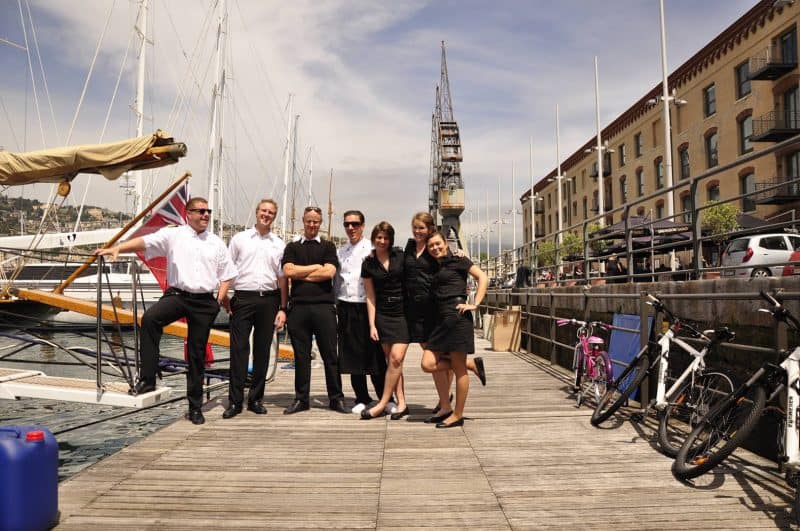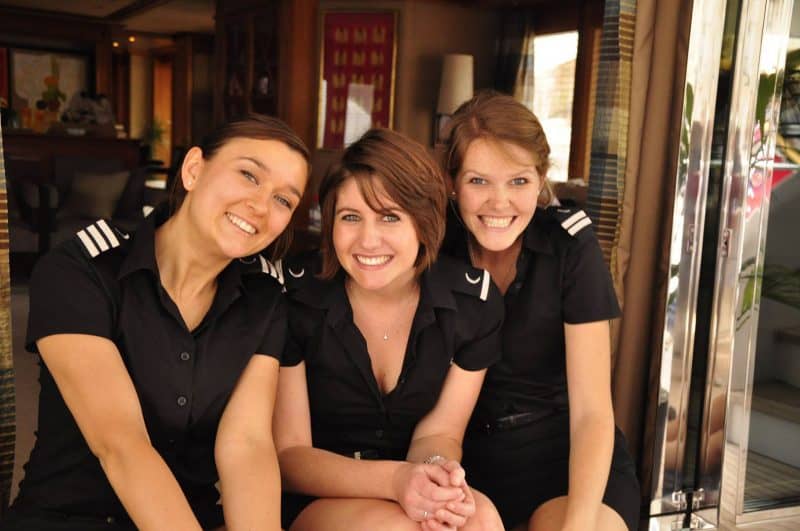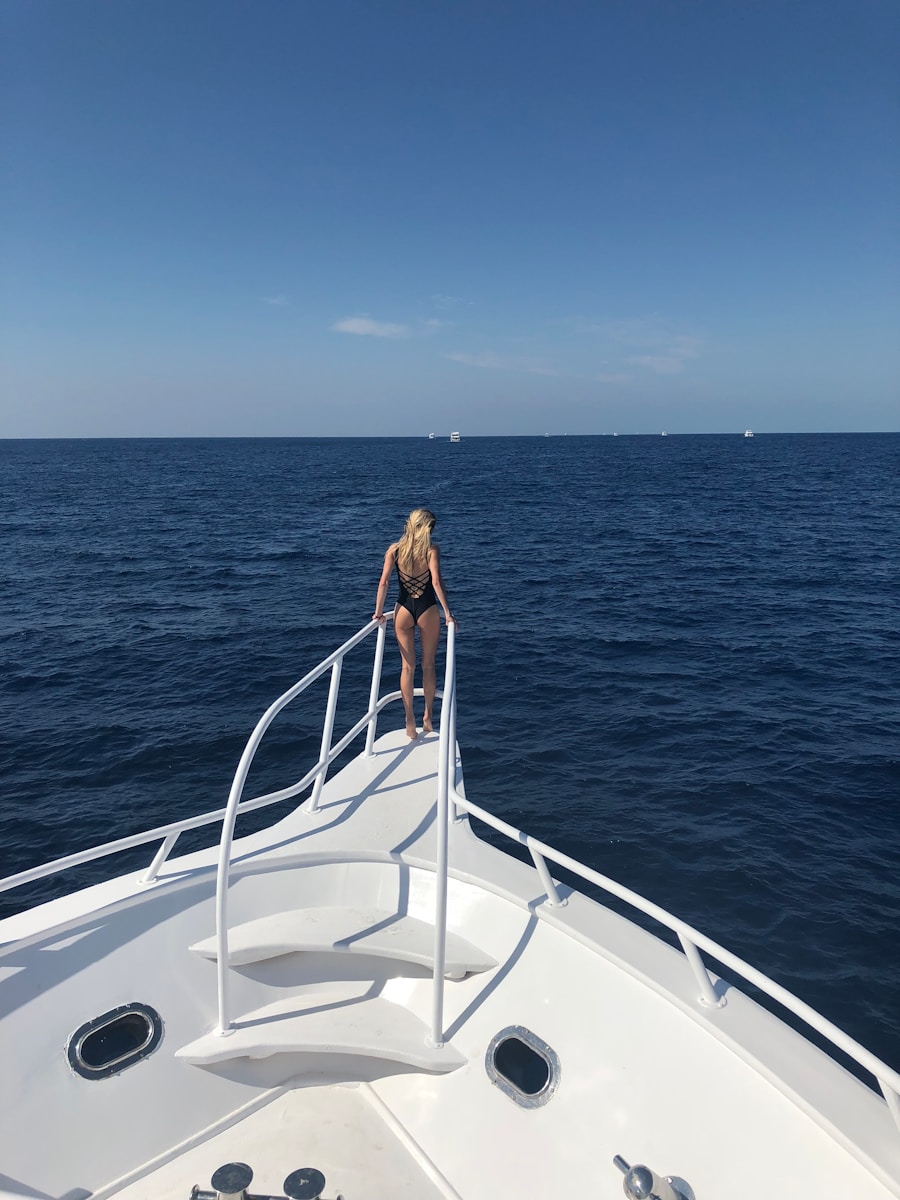Guide to Becoming a Yacht Stewardess Working on Superyachts
This working on superyachts guide is a authored by Carryn.
Working on superyachts seems glamorous, right? Your office overlooks crystal clear waters and your job involves stepping into the life of the rich and famous.
Not to mention, you get paid a fortune whilst doing so! But, as with most things in life, there’s more to the yachting industry than what meets the eye.
This guide details all the steps to getting a job working on a super yacht and what life is really like as a yacht stewardess — the good, the bad and the ugly!
Table of Contents
- Before I Became a Yacht Stewardess
- After 6 Months Working on a Superyacht
- Working on Superyachts: The Basics
- The Salary for a Yacht Stewardness
- How to Work on a Superyacht: 6 Steps
- How Much Does It Cost to Work on a Super Yacht?
- What Is Life Really Like Working on Superyachts?
- How I Got My Job Working on a Superyacht
- Questions to Ask Yourself Before You Commit to Working on Superyachts
- More Jobs Abroad
Before I Became a Yacht Stewardess
After graduating from college in South Africa, I jumped straight into the working world and started “adulting”.
After 3 months of long, hard work, with very little pay, I decided that I was tired of being broke and living in debt.

In an attempt to see just how versatile my skills were, I quit my job in search of greener pastures on the other side of the world, France. Here, I began what I thought would be a lifelong career as a yacht stewardess. I was intrigued by the idea of working on superyachts, how glamorous it all was and of course the MONEY.
After 6 Months Working on a Superyacht
Working as a yacht stewardess changed my life for the better. When I left for France I was a young, naive college graduate who struggled to find a balance between traveling and being financially independent.
6 months later, which is a lot earlier than I’d expected, I decided to throw in the towel. The money I’d made was amazing yet never gave me the job satisfaction I was actually looking for. I returned home with a new-found love for my country, my family and the smaller things in life.

Working on superyachts put my life into perspective.
It was an extremely personal time filled with self-reflection and allowed me to appreciate and value my own personal skills and work ethic.
Working on Superyachts: The Basics
A superyacht is a large luxury boat that’s longer than 24 meters. These yachts are owned by the rich and famous and often make their way between the Caribbean and the Mediterranean waters.
These superyachts need crew to provide them with that 1st class service. And this is where the thousands of yachties come into play.

People often confuse working on superyachts with that of working on cruise ships. No, they are not the same! Working on a superyacht is a far more intimate job. There can be two to twelve guests on board and you’re at their beck and call 24 hours a day, 7 days a week.
It’s a grueling job that will have you working long hours in confined spaces, but the rewards are far greater than those of the cruise ships.
Is It Easy to Get a Job Working on Superyachts?
Yes and no.
The yachting industry is a difficult one to get into, but once you have your foot in the door, you’re guaranteed future work and better positions. However, getting that first job working on a superyacht is the hardest part.

You will struggle to secure a job in advance as most captains and crew agencies want to meet you in person before they hire you. As a result, you need to go to the yachting hubs where you will spend your time job hunting.
Securing a job takes time. For some, it’s a matter of days, but for most, it takes weeks or even months.
Connections Within the Yachting Industry
The saying “It’s not what you know, it’s who you know” never rang so true as it does in the yachting world. If you have connections in the industry, you shouldn’t have a problem getting a job as a yacht stewardess.

The yachting industry is a small one and referrals are the easiest way to land your first job.
Other Qualities Needed to Become a Yacht Stewardess
Owners want young, good-looking crew running around after them. As a yacht stewardess, your uniform consists of short skirts and tight shirts and you need to look presentable and professional at all times. If you fit this profile of a yacht stewardess, finding a job working on a superyacht will be a lot easier for you.
Your personality and drive also play a huge factor. Captains and owners want outgoing, energetic and friendly crew who will get on well with the rest of the team.
You have very little personal space and whilst conflicts are bound to happen, you will have to master the art of the “smile and walk away” and avoid confrontations with other crew and guests.
So yes, getting a job working on superyachts isn’t easy, but if you have the above points covered, I bet you could get a job!
Unlock FREE Flights and Hotels!
Credit cards aren’t just for spending—they’re your ticket to epic travel rewards!
By using the right card for your everyday purchases, you could earn points for free flights, hotel stays, and more. No tricks, just smarter travel. Ready to see how?
The Salary for a Yacht Stewardness
The starting salary for a yacht stewardess or deckhand is roughly 2,500€ per month. This is with no experience and excludes 10% tips —which you receive on chartered trips. These tips could quite easily match your base salary. And it’s all tax-free!

You have no rent to pay as you live on board the boat. Your meals are prepared for you by the qualified chef, and you don’t need to purchase any groceries or toiletries.
EVERYTHING is covered. What I saved in 5 months whilst working on superyachts has taken me a full year to make as an English Teacher in Korea!
Sounds too good to be true, doesn’t it?
How to Work on a Superyacht: 6 Steps
1. Do You Want to Become a Yacht Stewardess or a Deckhand?
Each of these superyachts needs 6-10 crew who all work together to ensure the smooth running of the luxury vessel. There are many positions available ranging from engineers to chefs but most crew start off as either a yacht stewardess or a deckhand.

Role of a Yacht Stewardess Working on a Super Yacht
As a yacht stewardess or stew, as it’s more commonly referred to, your main tasks are housekeeping and ensuring that the interior of the yacht is properly maintained. You need to provide the highest standards of hospitality and ensure that the guests are taken care of. To put it bluntly, you’re a glorified maid wearing a cute outfit!
Daily Tasks of a Yacht Stewardess
As a yacht stewardess, your daily tasks whilst working on a private yacht include meticulous cleaning of the interior of the boat such as the cabins, toilets and living areas. You’re responsible for all the laundry, ironing as well as flower arranging, and table setting for all meals.
You need to provide a silver service dining experience and make world-class cocktails whenever the guests request. If there are children on board your yacht, you may also be asked to keep them entertained whilst ensuring all your other tasks are completed.
Working Hours
Your days start when the first guest awakes and end when the last guest goes to bed! If they’re out clubbing until 4 am, you’ll have to stay up to welcome them back on board and perhaps serve them drinks upon their return.
There are no free weekends if you’re on charter and you rotate shifts with the other crew, who also work just as hard. Because of this, the hours are long and tiring and if you have demanding guests, you could feel completely broken by the end of it.
The workload and the sort of work changes depending on the season, whether you have guests on board and any maintenance issues.
Role of a Deckhand
The deckhand’s position is more geared for men and includes maintaining the exterior of the yacht as well as all the deck equipment. You scrub the boat, top to bottom and it’s a physically demanding role. Tasks include cleaning the engine, painting, and varnishing the deck. You’re in charge of the fenders and ropes as well as the tenders and jet skis.
Other Positions Available for Working on Superyachts
Perhaps you’re a qualified chef, engineer or beautician. These jobs are also available but with no prior yachting experience, you will struggle to find positions available.
You may want to apply as either a yacht stewardess or deckhand first, and highlight these additional skills in your CV. This is because there are more opportunities for stews and deckhands. Captains will also be reluctant to hire a chef or engineer who’s doesn’t have experience working on superyachts as the demands are different from those of the normal day job.
2. Requirements for Working on Superyachts
To find a job working on superyachts, there are a few basic requirements that you need to meet.
STCW95+10:
STCW stands for Standards of Training, Certification, and Watchkeeping for Seafarers. There are 5 modules that need to be completed within this required course. These include:
- Personal Safety & Social Responsibilities (PSSR)
- Fire Fighting
- First Aid
- Personal Survival Techniques (PST)
- Proficiency in Designated Security Duties (PDSD)
Eng 1 (Seafarer Medical Certificate)
This is an exam to ensure you don’t suffer from any existing medical condition that may deter you from performing your job. You’ll be required to take a urine sample and a doctor will perform a physical exam to ensure you have no issues with your sight or hearing.
Additional Courses to Work on a Superyacht
Once you’ve secured your position, your chief stewardess or captain will conduct proper in-house training to ensure you know how to work on a yacht and complete the tasks to their standards.
The below courses will prepare you for your new job and will add value to your yachting CV, but they are costly and are not a requirement.
- Stewardess courses where they cover interior care skills, silver service, table setting, cocktail service as well as flower arranging.
- Food Safety Certificate Level 2. This certification applies to crew working on MLC compliant yachts. Service personnel such as chefs and yacht stewardesses working out of the galley will need this food hygiene certification.
- Powerboat Level 2 allows you to ride the tender and is beneficial for deckhands.
3. Where to Get a Job: The Mediterranean or the Caribbean?
There are 2 yachting seasons: The Mediterranean and the Caribbean Season.
Each of these areas has yachting hubs where crew base themselves when looking for work. These towns are filled with aspiring yachties all gunning for the same position. Once the season is complete, your yacht may move to warmer waters or dock in the harbor until the winter season has passed.

The Mediterranean Yachting Season
The yachting season in the Mediterranean starts as early as April where these superyachts start crewing up and the season continues until August. The main hubs to look for work in the Mediterranean include Antibes in France and Palma de Mallorca in Spain.
The Caribbean Yachting Season
The Caribbean season is active all year round with September to March being the busiest months. Ft. Lauderdale in Florida is the main hub which attracts hundreds of crew every year. From here the boats move toward Antigua and St. Maarten in the Caribbean and as well as the Bahamas where guests enjoy the crystal-clear waters and tropical islands.
4. Visa Requirements for Working on Superyachts
- Caribbean: If you’re heading to the United States of America, you’ll need a B1/B2 Visa.
- Mediterranean: A Schengen visa is required if you are going to France or Spain.
- Seaman’s Book: Once you find a job working on a super yacht, you need to arrange a seaman’s book. This is recognized as proof that you are working on a yacht and is also a compulsory document when applying for a transit visa.

5. Working on a Private Yacht vs a Chartered Yacht
There are two kinds of superyachts: Private yachts and chartered yachts.
Private Yachts
Private yachts are used exclusively by the owner.
In some cases, the owner may use the yacht a few times a season and so the crew will have a more relaxed schedule. But don’t take this for granted. I spent 5 months working on a private yacht and had guests on board every day!

Chartered Yachts
Chartered yachts are hired by groups of people for a shorter duration.
You usually have a day or two to get the yacht ready for each charter. This means that the guests are always changing, and the routes are very busy. However, it’s standard for the crew to receive 10-20% tips from the guests. Not too bad if you ask me!
6. How to Land That Job as a Yacht Stewardess
So you’ve completed your yachting courses and you’ve decided whether you’re going to the Mediterranean or the Caribbean. Flights are booked, and visas have been organized. Now, you need to get a job working on a superyacht.
Find a Crew House for the First Week After Your Arrival
These crew houses are like hostels catering for new yachties. They are slightly more expensive than other accommodation you can find. However, it’s worth staying in a crew house for the first week while you try to find your way around your new surroundings.
If you’re heading to the South of France, I highly recommend “The Crew Grapevine” which is where I started off.
The crew houses are generally a stone’s throw away from the harbor and the staff working there understand the yachting world and will help you find your feet.

The owners of these crew houses are also highly respected in the industry and if you make a good impression, they may put in a good word for you with a captain they know. The crew houses also include free printing which is great when you have to print out hundreds of CVs.
Reserving Your Spot at a Crew House
These crew houses are extremely popular and because of the uncertainty of the yachting industry, you cannot book your spot in advance. Some people land a job working on a private yacht after 2 days and so they leave the crew house immediately, others only leave after 2 months!
The best way to get into a crew house is to keep in contact with them when you start organizing your trip.
Introduce yourself and let them know your plans. Then, a week before your arrival, mail them each day to see if they have openings available. I received an email confirming my booking the day I landed in France. Talk about cutting it fine!
After your first week, you would know your way around and would have met other yachties. Together you can rent an apartment for the rest of your stay as this is a far more affordable option.
Finding Daywork on a Yacht
Daywork is temporary work on board a superyacht where you help the other crew complete their duties, but you don’t stay on board the boat.
Daywork on a yacht is a great way of earning money and building up your CV whilst looking for a permanent job as a yacht stewardess.
You get paid $100 – $150 for the days’ work and this should be enough to keep you going for a few extra days.
Dock Walking
As the name suggests, dock walking involves walking through the marinas in search of work on a yacht. With a big, friendly smile on your face, you approach the many superyachts and hand your CV over to the crew.
You’ll most likely face rejection as the boats will have crew but hold your head up high and keep going! For tips on how to create the perfect CV, check this post out.
Security at some of these docks has become extremely tight and dock walking is not allowed in some marinas. This is especially true in the US so perhaps you need to look at some of the below options when looking for work on a yacht.
Yachts are interesting locations to work; you’re often plunged into very formal environments, so professionalism is key.
Register With Yacht Crew Agencies
Yacht crew agencies are often the first port of call for captains looking for a yacht stewardess or deckhand. Registering with these crew agencies can be done through an online application where you include your work experience, qualifications, current location and contact details. This is followed by an interview which needs to be done in person.
This is the easiest way to get a job working on superyachts but if you don’t make an impression, they won’t remember you.
Networking With Other Crew and Yacht Stewardesses
Making connections within the industry is of utmost importance when looking for a job as a yacht stewardess. Put yourself out there and find a common interest with other crew you meet. If they like you, they’ll pass your details onto their captains.

But of course, be aware that every new yachtie is looking to make these connections. You need to stand out from the rest and avoid hanging out in spots that only attract new crew.
The Wait
Getting a job as a yacht stewardess can take days, weeks and even months. However, I firmly believe that this is dependent on the individual. I’ve met people who’ve invested all the time and money into working on superyachts and after a few months, they’ve had to return home as they were unsuccessful in finding a job and so their funds ran dry.
The competition is strong and when you’re at these yachting hubs, you may feel overwhelmed by the number of newbies in the industry. But, your luck can change in an instant.
How Much Does It Cost to Work on a Super Yacht?
Getting into the yachting industry is not cheap as your initial expenses are NOT covered. You need to support yourself financially until you get a job working on a superyacht. It’s a big investment, but one that you can pay back within your first month of work.
Cost for these courses vary between countries and all amounts below are estimates.
These expenses include the following:
- STCW: $600-$1,200 for the 5 courses ($900 average)
- ENG1 Medical: $80
- Flights to the yachting hubs in the Mediterranean or Caribbean: $1,000
- Visa: $60-$120
- Accommodation for your first week: $275
- Meals for your first week: $200
- Additional expenses: $100
- Total expense = $2,645
Bearing in mind that it can take weeks, if not months to find a job, your cost for food and accommodation could be considerably higher.
What Is Life Really Like Working on Superyachts?
Your first season working on a superyacht will always be tough. Because you have no experience, you’ll most likely take the first job you can find as beggars can’t be choosers. You won’t really know what you’ve signed up for until you start working.
You’re the junior stewardess and everyone else has put in the hours and earned their stripes, now it’s your turn!
You may work a bit longer than the rest, you’ll be put in the laundry room and spend the entire day ironing and you’ll be the one waking up early. You’ll travel to exotic locations with the most stunning scenery. But you’ll only enjoy these views from the portholes of the cabins as there’s cleaning to be done.
But after you have one season under your belt, you’ll have more connections and can pick and choose what sort of yacht you want to work on. You will be able to find out which boats have easier guests and schedules and you won’t need to jump at the first job offer you get.
RELATED: 10 Jobs Abroad With Accommodation (& Without Experience!)
How I Got My Job Working on a Superyacht
I started my yachting career in Antibes, France. After 3 days of dock walking, I was feeling extremely unmotivated by the sheer amount of crew looking for work.
I had invested so much time and money into getting to France, and financially I only had 2 weeks to find work before I was broke!

It was a beautiful sunny day and a lot of people were going to the beach to relax after a busy week of dock walking. I was torn between taking the morning off or continuing my search for work as a yacht stewardess. Reluctantly, I decided to first go to a few crew agencies and see if I could chat with one of their staff.
I must have made a good impression because two hours later I received a phone call for an interview with a captain. After a successful chat, I accepted the position and a few hours later I was on a train to Italy to start my career as a yacht stewardess working on a private yacht.
Questions to Ask Yourself Before You Commit to Working on Superyachts
1. How Much Time Do You Have to Get a Job?
It’s important to put pressure on yourself and set deadlines. Financially I only had two weeks to support myself. This was cutting it fine, but I feel that this pressure is what lead to me finding a job after only 4 days.
2. Do You Believe in Yourself?
You’ll face rejection but will need to keep pushing through in order to secure a job. You’ll also have to justify the initial investment and if you don’t believe that you can cut it in the yachting industry, then perhaps you need to look for something less risky
3. Are You Ready to Work Your Ass off Every Single Day?
Some days I worked for up to 18 hours and had very little sleep. My nails and fingers were scarred with blisters and cuts from washing so many crystal glasses. My skin went bad from not seeing the sun, and my legs were developing varicose veins from standing up all day.
But my crew were amazing. We all worked equally hard and supported each other on the difficult days. You might be lucky and find a sweet job with an easy schedule, however, prepare for the worst but this will only make you stronger.
In the end, my experience and the money I made was totally worth it. Think long and hard if you think you’re up for this kind of lifestyle. There are some that stick around and end up with great jobs who get extra tips and even flights to whatever country they want. It’s a fabulous job if you think you’re game for the challenges that come with it.
Do you have what it takes to work on a superyacht? Do you want to become a yacht stewardess? Let us know in the comments!
>>> Bio
Hey, I’m Carryn! I’m a nature enthusiast and passionate explorer who loves hiking, diving, and adventuring through new countries. My travels have taken me from the peaks of Kilimanjaro to the underwater worlds of Indonesia and have lead me to Korea where I am teaching English. I share my travel stories on my blog, Torn Tackies, where I aim to inspire people to step out of their comfort zone and explore the world that surrounds them.










Hi Nina, thank you so much for the information. I’m looking at doing my course (again) in November. Unfortunately I didn’t pursue the yachting industry the first time I did my course as I started working on the ships. But your insight has really motivated me to try again, so thank you.
Thank you Nina for sharing your info and guiding us, i do have a question though, i am a type one diabetic, and really want to work on a yacht, i am already currently in the Hospitality industry. Do you know whether type one diabetics are allowed to work on yachts?
Hi Nadia, did you ever get a. answer?
Great info ! Thank you so much for sharing your experience, I’m looking forward to become a stewardess,
I have a question: for working in the Mediterranean Sea it doesn’t matter which Schengen visa? I might have the chance chance to do a German visa, would that work?
Thank you again
J+
Thank you, Nina!
I am heading to Antibes on May 1st to find my first yacht job and I am super excited! I’m always reading online and checking out any information I can in order to prepare, so this blog was a prize to find as it is loaded with fantastic info!
Hope you’re having a fantastic day, wish me luck!
Yes! The best of luck 🙂
Hi nina i have already documents f
Seaman book and passport
Eng1,
food safety and level hygiene level 2
Stcw
Sdsd
My probllem is only the visa i want to earn already
Can you tell me whats lacking ,
How is the procedure in landing yachts ?
I think sometimes that when i travel my own expense in goin ‘
Like france
I think its too expensive
Or i think in mind that when i applied in us embassy here in philjppines for b1b2 visa
W/out a company yet is hard for me
Coz.i didnt travel yet in any location overseas
I have first in mind that i justonly denied for that
Pls can you help me my dear ffriend
Can you pls.humbly assist me in my dream career
I am a greenie and recently took my iyt yacht card here in manila philippines
Its been an honor to have an indtrument /way like you
On helping othera like me
I want t hear your quick
Humbly help my friend
Thank you so much Nina for all of this information! You’ve made me more excited to start my yachting career. I am heading to Phuket next month to take my STCW + Stewardess course, then am hoping to head over to Antibes after to start looking for work by March 🙂
That sounds SO exciting! Have fun 🙂